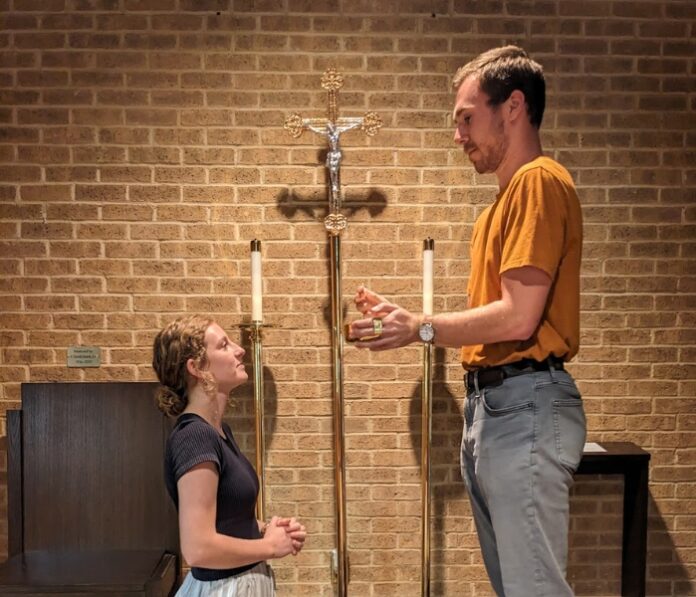Disclaimer: All articles published under this section are the opinions of the respective authors and do not necessarily reflect the opinions of The Cor Chronicle
To kneel or not to kneel? On the hands or on the tongue? From lay Extraordinary Ministers of Holy Communion or from ordained ministers?
There has been a recent movement in the Catholic Church to make Mass more reverent. The most important place in the liturgy for reverence is undoubtedly when God becomes truly present in our midst.
Young Catholics, with the intention of renewing their mode of worship, have been taking up more traditional manners of paying homage to the Eucharist.
You can see it for yourself at the Church of the Incarnation. People are falling to their knees on the hard bricks in front of the ministers of Communion. They are receiving the Host on their tongues. Some will not share the sign of peace with you. Some are avoiding the Church at large because lay people are allowed to offer Jesus to them.
Senior pastoral ministry major J.D. Self commented on the reverence he sees in the church. “I think that the [Church] of the Incarnation has more reverence than a lot of churches […] That’s very praiseworthy, but I think that we can be a whole lot more reverent.”
Many who receive on their tongues – and I professedly am one – argue that no one should ever receive on their hands because of the jeopardy of losing a particle of the most precious Body of Christ. Each particle, after all, is wholly the Body, Blood, Soul and Divinity of Jesus.
“I do think,” said Self, “that receiving on the tongue is certainly one of the more important pieces of advice.” Unless you can ensure that no part of the Host falls to the ground or remains unconsumed, then you ought to receive Him on the tongue.
It is also important to remember that how you pray reflects what you believe. There is a Latin saying that sums this up: “Lex orandi, lex credendi, lex vivendi,” or ‘The way that you pray is the way that you worship and the way that you live.’
In other words, people ought to pray and worship in the way most conducive to the kind of life they want to lead. This is why there is a new movement to add kneelers to the chapel. Kneeling to the Eucharist is a time-honored way of outwardly showing an internal submission to Christ.
Self closely connects the two contentious acts of reverence: kneeling and receiving on the tongue. Self said, “If I personally could change one thing, I would add an altar rail to every church because that communicates receiving on the tongue as a default.”
Modern-day Catholics typically stand or kneel based on the rite of their upbringing. Those who grew up in a Novus Ordo parish tend to stand, and those who grew up going to Ordinariate or Tridentine Masses tend to kneel.
Some Catholics have issues with the practice of using Extraordinary Ministers of Holy Communion. EMHCs, as they are called, seem rather extraneous in a community like that of UD.
“We don’t need Extraordinary Ministers,” Self said. “We are surrounded by tons of priests and religious and consecrated.”
Self spoke further on the topic of EMHC deportment. “Why do we have a dress code for lectors when lay people can hold Christ with unconsecrated hands and give Him to people wearing gym shorts and a graphic t-shirt?”
“At the very, very bottom minimum, we need to have a dress code for Extraordinary Ministers,” said Self. This, he claims, is even more important than bringing kneelers into the chapel.
Kneelers and EMHCs aside, what matters about Mass primarily is that you go. You should not allow any of your dispositions or biases to get between you and Christ in the Eucharist.
That being said, it is not a bad thing to want to elevate your experience in Mass. The Mass is, after all, a meeting point of the transcendence of the Creator and the mortality of His creation.
All that can be done to make everyone’s encounter with God more transcendent, should be implemented. Whether that is a dress code for EMHCs or individual choices to kneel and receive on the tongue, why not start here, at our beloved Church of the Incarnation?
“The people want a kneeler,” Self said.
Do you agree, and, more importantly, are you going to do something about it if the answer is yes?
Samuel Korkus is a sophomore English major. He is a member of UD’s Young Americans for Freedom chapter.


We did reinstall the Communion rail, the high altar, the reredo, side altars and ambo.
Unfortunately, the elderly cannot always kneel bc of balance, knee replacements and other mobility or lack thereof, issues. I totally agree re dress code for all! From my spot in choir, I see it all! Modesty reigns supreme in deference and reverence to the One Who is to be received. I have no problem with EMs. They are specifically trained for their holy task. Christ and his apostles “broke bread”. Ever see a rendition of The Last Supper with the 12’s tongues extended around a rustic table? Me, neither! And with Covid and flu season, hand reception properly is safer, IMHO. Smart clergy and EMs are always on the lookout for unconsuned Hosts, or should be, as part of their training! Net: better post Vat 2 catechesis on the Real Presence is in order, along with solid homilies at Mass. I rest my case.